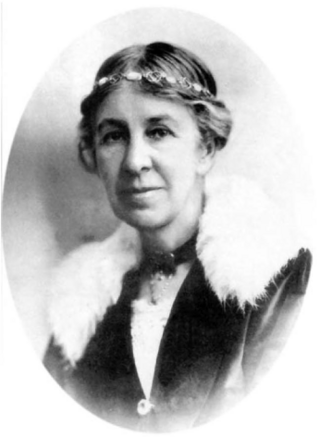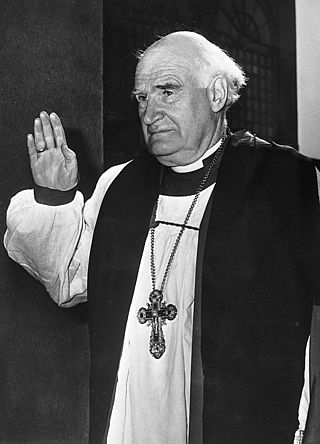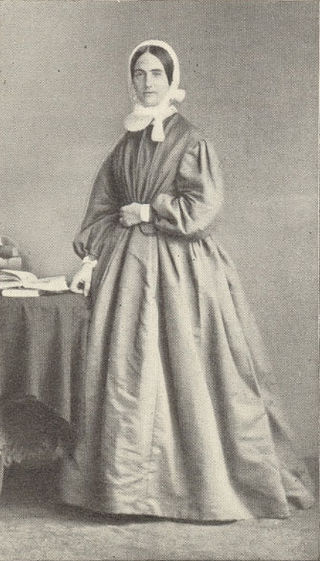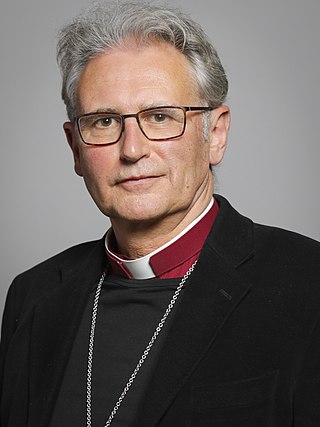Related Research Articles
Anglicanism is a Western Christian tradition that has developed from the practices, liturgy, and identity of the Church of England following the English Reformation, in the context of the Protestant Reformation in Europe. It is one of the largest branches of Christianity, with around 110 million adherents worldwide as of 2001.

A deacon is a member of the diaconate, an office in Christian churches that is generally associated with service of some kind, but which varies among theological and denominational traditions. Major Christian churches, such as the Catholic Church, the Oriental Orthodox Churches, the Eastern Orthodox Church, the Scandinavian Lutheran Churches, the Methodist Churches, the Anglican Communion, and the Free Church of England, view the diaconate as an order of ministry.

The Lambeth Conference is a decennial assembly of bishops of the Anglican Communion convened by the Archbishop of Canterbury. The first such conference took place at Lambeth in 1867.

Evelyn Underhill was an English Anglo-Catholic writer and pacifist known for her numerous works on religion and spiritual practice, in particular Christian mysticism. Her best-known is Mysticism, published in 1911.

Arthur Michael Ramsey, Baron Ramsey of Canterbury, was an English Anglican bishop and life peer. He served as the 100th Archbishop of Canterbury. He was appointed on 31 May 1961 and held the office until 1974, having previously been appointed Bishop of Durham in 1952 and the Archbishop of York in 1956.

The ministry of a deaconess is, in modern times, a usually non-ordained ministry for women in some Protestant, Oriental Orthodox, and Eastern Orthodox churches to provide pastoral care, especially for other women, and which may carry a limited liturgical role as well. The word comes from the Greek diakonos (διάκονος), for "deacon", which means a servant or helper and occurs frequently in the Christian New Testament of the Bible. Deaconesses trace their roots from the time of Jesus Christ through to the 13th century in the West. They existed from the early through the middle Byzantine periods in Constantinople and Jerusalem; the office may also have existed in Western European churches. There is evidence to support the idea that the diaconate including women in the Byzantine Church of the early and middle Byzantine periods was recognized as one of the major non-ordained orders of clergy.

Anthony Wilson Thorold was an Anglican Bishop of Winchester in the Victorian era. The son of a Church of England priest, he also served as Bishop of Rochester. It was in that role that he travelled throughout North America and met with leaders of the Church of Jesus Christ of Latter-day Saints. While he wrote a number of devotional books, he is best remembered for having recruited Isabella Gilmore to revive the female diaconate in the Anglican Communion.
The word saint derives from the Latin sanctus, meaning holy, and has long been used in Christianity to refer to a person who was recognized as having lived a holy life and as being an exemplar and model for other Christians. Beginning in the 10th century, the Catholic Church began to centralise and formalise the process of recognising saints; the process whereby an individual was added to the canon (list) of recognised saints became known as canonisation.
The Community of St. Andrew (CSA) is an Anglican religious order of professed sisters in holy orders or who otherwise serve in diaconal ministry. The community was founded in 1861 by Elizabeth Ferard, with the encouragement of Bishop Tait of London. It is based in London, England, in the Diocese of London of the Church of England.
The Seal of the Confessional is a principle within Anglicanism which protects the words spoken during confession. Confession has certain censures on disclosure as there is an understanding among the clergy that there is an inviolable confidence between the individual priest and the penitent. This principle should not be confused with the rarer practice of lay confession, nor with the public confession of sins which is an element of most eucharistic liturgies throughout the Anglican Communion. The "Seal of the Confessional" refers specifically to the private confession of sins by an individual, in the presence of a priest, the form of which is regulated by the 1662 Book of Common Prayer and later liturgical sources.

The Anglican ministry is both the leadership and agency of Christian service in the Anglican Communion. "Ministry" commonly refers to the office of ordained clergy: the threefold order of bishops, priests and deacons. More accurately, Anglican ministry includes many laypeople who devote themselves to the ministry of the church, either individually or in lower/assisting offices such as lector, acolyte, sub-deacon, Eucharistic minister, cantor, musicians, parish secretary or assistant, warden, vestry member, etc. Ultimately, all baptized members of the church are considered to partake in the ministry of the Body of Christ.
The veneration of saints in the Episcopal Church is a continuation of an ancient tradition from the early Church which honors important and influential people of the Christian faith. The usage of the term saint is similar to Roman Catholic and Orthodox traditions. Episcopalians believe in the communion of saints in prayer and as such the Episcopal liturgical calendar accommodates feasts for saints.
The Province of the Anglican Church of Burundi is a province of the Anglican Communion, located in East Africa between Tanzania, Rwanda, Kenya, and the Congo. The Archbishop and Primate of Burundi is Sixbert Macumi.

Christopher John Cocksworth is a Church of England bishop in the open evangelical tradition. He is the current Bishop of Coventry; prior to becoming bishop he was the Principal of Ridley Hall, Cambridge.

Isabella Gilmore was an English churchwoman who oversaw the revival of the Deaconess Order in the Anglican Communion. Isabella served actively in the poorest parishes in South London for almost two decades and she is remembered with a commemoration in the Calendar of saints in some parts of the Anglican Communion on 16 April. She was the sister of William Morris.

Elizabeth Catherine Ferard was a deaconess credited with revitalising the deaconess order in the Anglican Communion. She is now remembered in the Calendar of saints in some parts of the Anglican Communion on either 3 or 18 July.
Joan Elizabeth Spencer-Smith (1891–1965) was a notable New Zealand Anglican deaconess and lecturer. She was born in London, London, England in 1891. Her brother was the Rev. Arnold Spencer-Smith chaplain and photographer to Shackleton's Imperial Trans-Antarctic Expedition.
Carol Graham was an English Anglican missionary, deaconess of the Church of South India, ecumenist and spiritual writer.
The Farncombe Community was an ecumenical community of women founded in 1964 by Sister Carol Graham to work and pray for the unity of Christian denominations, and based in Farncombe in Surrey. The Community came to an end in 1989.
Dorothy Edna Genders (1892–1978) was an Australian charity worker and a deaconess in the Anglican Church of Australia. Known as "Sister Dorothy," she was notable for being one the first women to graduate with a Licenciate in Theology in Australia. She provided pastoral care, taught Sunday school, and trained candidates for the deaconess role. She also established and managed housing for vulnerable women. In East Perth, she turned the church rectory into a refuge for women survivors of domestic violence and prostitution. In Cottesloe, she opened a home for the destitute. She died in 1978, in Subiaco, a suburb of Perth.
References
- Morgan, Edmund R., Reginald Somerset Ward 1881-1962: His Life and Letters' (Mowbray, London, 1963)